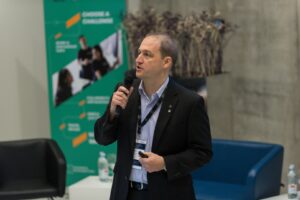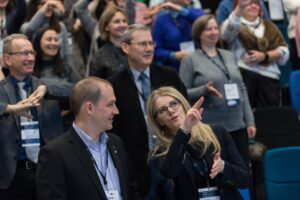Third-year student Kamilė, rushing from her lectures to work, dreams of how great it would be if you could watch lectures whenever and wherever you want, like TV series. Vytautas, who has been wanting to change majors for a couple of years now, is checking university curricula – he knows some of what is taught but has no diploma to prove it. Rasa, who wants to improve her public speaking skills, compares the cost of online courses at Cambridge and Harvard.
Although the people described above are fictional, the situations they experience are real. A “Eurostudent” survey in 25 European countries shows that more than half of students work while studying. In Lithuania, almost 80 % of students work, and as many as 60 % work during lectures. A 2021 World Economic Forum report said that by 2025, almost half of the world’s workforce will need to retrain or acquire new competences.
In the past, university could be forgotten after graduation, because it was one of the stops on the way to a career. Today, the function of higher education institutions is changing and adapting to the needs of learners. Challenges like lifelong learning, retraining, flexible learning pathways open new opportunities for all stakeholders.
“First and foremost, flexibility means that the learner can develop exactly the competences they need at the time and at a pace and place that suits them. This includes many things, but also the possibility to integrate the learning process into one’s lifestyle”, says Kristina Ukvalbergienė, Vice-Rector of Studies at Kaunas University of Technology (KTU).

Today, she said, learning transcends national boundaries, and the supply of high-quality content is driving the need for universities to strengthen their cooperation with each other, to form alliances and to offer international and interdisciplinary learning experiences.
According to Professor Euan Lindsay of Aalborg University in Denmark, today’s studies need to be designed to fit in with learners’ lifestyles. Today’s students can find any content (films, podcasts, videos) on-demand (online) as soon as they need it. Naturally, they want to access theoretical material when it is convenient for them, but not necessarily at the same time as a scheduled lecture. According to the expert, this change is inevitable and higher education institutions will have to adapt.
“A hundred years ago, the horse was the main mean of transportation. Today, however, although you can buy a horse and travel on it, it is far from the norm. Once we see the advantages of making learning material available on demand and online, rather than synchronously, the higher education system will simply adapt,” says Lindsay, professor at the Centre for Problem-Based Learning in Engineering Science and Sustainability at Aalborg University.
Prof. Euan Lindsay, Aalborg University
He says that while it was used to be the norm that lectures at the university were only live, this perception is changing. Part of the change has been triggered by the coronavirus pandemic, which has opened the way to various forms of distance learning. Today, lectures can not only be remote, but also recorded, and can be listened to on the move, pausing and replaying important moments. In addition, there is a wide range of material available on a given topic.
“Face-to-face contact is much more suitable for building relationships, but we can do it online too. A webinar is not the right method for learning professional practice, but if the purpose of the lecture is to introduce a new theory or concept, students can go through the material at their own pace and time. In a face-to-face meeting, it is possible to discuss unclear points or do practical exercises to apply the theory,” says Lindsay.
The internet is already full of material on a wide range of topics, presented by talented speakers who are interesting to listen to. Problem-based learning expert Euan Lindsay believes that the visual presentations of theoretical material may eventually be taken over by major textbook publishers. Universities will continue to be the forge of competences, but they will have to become more flexible and adapt to change.
When we look at cathedrals, we don’t think of bricks

According to K. Ukvalbergienė, Vice-Rector of KTU, the flexible learning pathway is a learner-centered learning model that allows everyone to choose their own individual learning process, regardless of the competences they have acquired. At each stage of the learning process, different learning choices are offered to the learner, based on their needs, interests, and required competences. Learning takes place in small chunks, constructing a flexible learning path from challenges and micro-modules.
While KTU students can already choose additional competences for their individual learning plan, by 2025 the university plans to offer its students the option of flexible learning pathways.
“It is up to the student to choose the competences they want to develop, and to chart their own learning path. Competences can be developed horizontally, that is, broadly, or vertically, by delving into a specific area. In the case of KTU, flexible learning pathways are closely linked to a challenge-based methodology, where students, lecturers and external partners work together to solve real-world challenges,” says Ukvalbergienė.
A. Lindsay, who gave a presentation at the annual event “Study Quality Day” organized by KTU, says that one of the changes that universities need to introduce to adapt to the modern market is the “liberation” of study programs. That is, they should be designed with the outcome in mind, with what we want our students to be able to do at the end of their studies.
“When we look at cathedrals, we don’t think about the individual bricks that make them up. If we want our students to learn how to build cathedrals, we need to think about the competences they need to build them. How we’ll teach them thermodynamics or mathematics, how we’ll test their knowledge, these are just the details”, says Lindsay.
University provides much more than a degree.
As for the individual “bricks”, we inevitably come back to the future “builders” of the cathedrals, i.e. the learners. Today, they can be a wide range of people – those with work experience, those returning to higher education after a break from studies, those pursuing new career goals that require further education.
According to the World Economic Forum’s Future Jobs Report, 44% of workers will need to update their skills portfolio as technology is evolving at an extremely fast pace. However, cognitive, and personal skills such as analytical, creative, systems thinking, curiosity, resilience and flexibility are among the skills that will be particularly in demand.
The Vice-Rector of KTU says that the entire environment at the university is suitable for intensive absorption of knowledge and at the same time, in addition to the skills necessary for the specialty, to acquire the ability to work in interdisciplinary and international teams, to cooperate, to think strategically, to manage time and other skills. The university is concentrated and easily accessible, provides opportunities for experimentation in a variety of laboratories, and has lecturers who have the experience and capacity to develop learners’ competences.
However, from her point of view, the university is not the only party in the education system. Some retraining programs require high speed or very narrow specialization, and this niche can be filled by other organizations.
“A university is part of an ecosystem. Working together with the city, the region, and business, we share a common goal, to educate responsible and value-added members of society. All these aspects add value to university education,” says K. Ukvalbergienė.
Future University as a travel agency
The need to obtain evidence of qualification – a diploma – can arise at any stage of your career. For example, qualifications may be needed to apply for a promotion or a license, and there is evidence to suggest that higher education is associated with higher incomes. People who are already established in the labor market have knowledge and skills and may feel that they have a good understanding of some subjects in the studies.
“I remember one student whose journey to the university to do his mandatory lab work on surveying equipment took a couple of hours. I met him once when he was very upset, and when I asked him what was wrong, he said that repairing this equipment was his daily job,” says Lindsay.
He believes that in this situation universities need flexibility. Jokingly, Lindsay compares universities of the future to travel agencies: if you want to travel, you can book your own plane tickets, hotel, and tour program once you get there. But you can also ask a travel agency to do the same for you and they can take care of the whole trip, or just certain aspects of it, as required.
“Universities that are better suited to the current situation are those that say: if you start your studies already knowing some things, we’ll take credit for them and teach you what you don’t know yet,” says Lindsay.
K. Ukvalbergienė, Vice-Rector of KTU Studies, says that KTU has been applying the recognition of competences acquired through non-formal and informal learning for more than ten years.
“For example, if you think you have a certain competence, say in project management, the university can test your skills and formally recognize this competence. Formally recognized competences can be counted as outcomes of a university study program or module, without the need for further study,” explains Ukvalbergienė.
Today’s graduates will remain in the labor market for the next 50 years
Lifelong learning is gaining momentum, not only because it is being promoted by various national and international programs, but also because society is demanding it. The world is changing, people are living longer, technologies are advancing faster and the need to update knowledge is becoming essential.

“Today’s university graduates may be 90 or 100 years old, and it is likely that they will certainly be working by the time they are 70. Do you think they won’t need to update their knowledge in the next 50 years? Personally, I certainly wouldn’t want to base my current practice on what I would have learnt in the 1970s,” says Lindsay about the realities of today.
Lindsay and Ukvalbergienė, who have been teaching for about 20 years, agree that students today are much more concerned than in previous generations about the meaningfulness of their studies.
“I used to think that today’s students were interested in changing the world, but now I think differently. I think they are not interested in changing the world, but in changing their close environment. This is a very different kind of leadership: not the noisy grandiose goal setting, but the pursuit of individual change for the city, for the community,” says Lindsay.
According to Ukvalbergienė, today’s students are more socially responsible and want to see the real value of the subjects they study. Challenge-based learning, cooperation with social partners and exposure to the real working environment play a key role in this.
While qualities such as curiosity, creative thinking and problem-solving may be common across generations, there is one skill in which today’s students may be outperforming their lecturers: they are much more tech-savvy.
“Long before that, the world was at a tipping point where younger people were outpacing older people in technological skills. This turns the whole logic of learning on its head and universities need to adapt to it,” says Ukvalbergienė.
However, experts agree that the democratization of the learning process, where the lecturer is no longer the only person who knows best, is essential to meet the needs of today’s learners. Today’s students are themselves very diverse and expect flexibility from the university to adapt to their individual lifestyles.